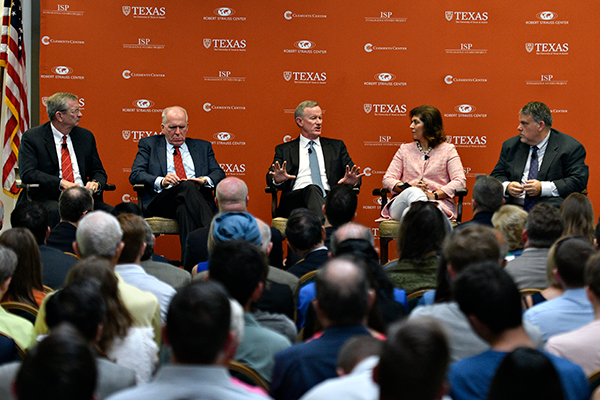United States foreign policy needs to include a greater focus on partnering with countries known to have issues with terrorist groups and stopping young people from joining them in the first place, former national security officials said during an on-campus panel Tuesday.
The panel, hosted by the UT Intelligence Studies Project the day before the 18th anniversary of the 9/11 terrorist attack in New York City, featured former CIA director John Brennan, former U.S. Special Operations Commander Adm. William McRaven and other national security officials.
The panelists spoke to a packed house at the Etter-Harbin Alumni Center to discuss how counterterrorism has changed since 9/11, how it can be improved and how extremism has evolved in the last few years.
Brennan, a UT alumnus, said the U.S. must do a better job of addressing the factors that contribute to terrorism. He said one of these factors is how people in Middle Eastern, Southeast Asian and African countries see extremist ideology an outlet when dealing with economic deprivation and government repression.
“It’s not just a question of being able to address the violent manifestations of this phenomenon,” Brennan said. “It is trying to understand and to address those … factors and conditions that really contribute to that violent expression that comes out of those terrorist and extremist organizations.”
McRaven, a former UT chancellor and current national security professor at the LBJ School of Public Affairs, said he disagrees with the notion that the U.S. wants to exploit countries with terrorist groups simply for its own interest. He said the U.S. has a responsibility on behalf of the world with its counterterrorism efforts, but it should not dictate a country’s solutions. Instead, he said America needs to work with a country’s local institutions to give them the tools and training to fight extremism on its own.
“We have to take that sovereign aspect out of some of this and try to do things that are going to be … not just viewed as a benefit to society, but truly are,” McRaven said. “It has to have more of an independent, unbiased approach to some of these issues.”
Farah Pandith, a former official with the National Security Council and U.S. State Department, said the U.S. has failed to tackle how influential the ideology of extremist groups can be for younger people because it does not spend enough money fighting terrorist organization recruitment. She said one of the issues attracting young people in Muslim-majority countries to terrorist groups is the need for an identity and a sense of belonging. This allows extremist groups to use a narrow, monolithic version of Islam to recruit those young people, when in reality it is a 1,400-year-old religion with hundreds of ways to worship, Pandith said.
“How do you get young kids to own their identity in such a way that the bad guys can’t come in and suck you in?” Pandith said. “That’s the job we have to fight. We need to understand that the issue of identity and belonging is not the responsibility of just government. It’s the responsibility of all of us.”





















